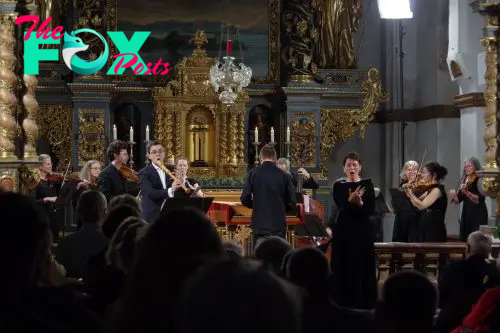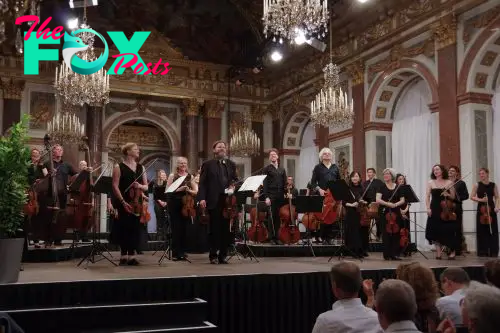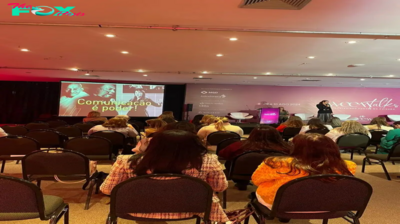Entertainment
the enchanting Herrenchiemsee Competition – Seen and Heard Worldwide
 Germany Herrenchiemsee Festspiele 2024: Chiemsee, Germany. (LV)
Germany Herrenchiemsee Festspiele 2024: Chiemsee, Germany. (LV)

The Herrenchiemsee ComPetition has a historical past, for the standard of the music, the programming, the musicians and the perfection of the setting: two islands within the largest lake in Bavaria. Herreninsel has certainly one of King Ludwig II’s fairytale castles, known as Herrenchiemsee and modeled on the palace at Versailles. Fraueninsel is the positioning of one of many oldest Christian church buildings in Europe. The lake is an hour’s prepare journey from Munich, and a brief, idyllic ferry experience brings music and different lovers to the islands. The theme this 12 months was ‘I wish to stay an everlasting thriller. . .’, reflecting the King’s dying want. The ComPetition ran for twelve days starting on 16 July.
I caught the final ferry to Fraueninsel on 17 July for a live performance on the Benedictine monastery, led by the younger recorder virtuoso Max Volbers with a chamber ensemble from Concerto Köln. The music was by J.S. Bach and a youthful modern, Johann Adolph Scheibe. It was billed as ‘Unequal Rivals’ as a result of the in any other case obscure Scheibe had turned critic and accused Bach of being too Italian, too florid for his strong German tastes.
It made no distinction to the boyish-looking Volbers, who moved like a recorder-playing cat, crouching and sweeping into musical phrases together with his complete physique. He performed round and improvised when repeating sections that have been infused with wild and great riffs. He phrased with a wandering ear for small rhythmic particulars and reveled in scrumptious curlicues. Whether or not enjoying certainly one of his recorders or main from the harpsichord, the sounds he and the gorgeous-sounding Camerata Köln have been a shocking instance of the heat and colours that solely interval devices and impressed soloists can produce.
Volbers started with a pastiche concerto taken from two of Bach’s most acquainted concertos, one initially for violin and the opposite for harpsichord, and every motion appeared to show the purpose Scheibe was making an attempt to make. Though in such an immersion in sound and magnificence it turned troublesome at occasions to kind out one composer from the opposite – who cared? It was a time when such points mattered, and a cat may have a look at a king.
The musical riches have been multiplied every time Laila Salome Fischer used her dark-toned mezzo-soprano to surge unexpectedly with emotion, then soothe with tender delicacy. In each Scheibe and Bach, she crammed the church along with her voice of many vibrant colours, splendidly vigorous, her candy spots aligning completely with Camerata Köln’s vibrant enjoying and the church’s resonance. Carla Blessing’s efficiency of Scheibe’s completely obscure and completely beguiling Concerto for Oboe d’amore was equally miraculous. Her plaintive tone, the sound of a easy soul, blended in with Camerata Köln on the high of their sport, wealthy and clear on the similar time, filling out the music’s harmonies as if partaking in an intimate non-public dialogue.

The next night time, the live performance was within the Corridor of Mirrors on the Herrenchiemsee Palace, the place the interval instrument Orchestra of the Eighteenth Century took some time to get into correct stride, as in the event that they have been caught in a time warp between Haydn and Beethoven. They opened with Cherubini’s introduction to the cantata he wrote on listening to concerning the loss of life of Haydn, primarily based on a report that was, like Mark Twain as soon as mentioned, ‘an exaggeration’. Though it was superbly performed, it was just a little incongruously dour for the event.
The orchestra switched gears for the primary (regardless of its numbering) of Haydn’s twelve London Symphonies, a purely musical miracle even when musicologists now inform us that it was on the premiere of his Symphony No.102 {that a} chandelier fell with out injuring anybody. Alexander Janiczek on the helm didn’t take the primary motion repeat which shortened the scale of its enjoyment, most likely extra for critics than for most of the people. They performed as if all of the pauses have been alternatives to pique the viewers’s curiosity, scored with their rustic phrasing within the Trio, and unleashed Haydn’s internal kettle drummer within the madcap Finale.
After the intermission, the orchestra’s efficiency of Beethoven’s Symphony No.1 hit its stride on the opening gate. They captured the younger stallion champing on the bit to take over the symphonic reins from Haydn, notably within the Menuetto the place the orchestra performed as in the event that they understood that this was the start of the symphonic scherzo. Janiczek took all of the repeats there are to take, which heightened the musical affect. The dialogues throughout the orchestra additionally turned extra outwardly directed and interesting. Tempos have been on the fast facet – they performed the concluding Allegro molto e vivace nearly as quick as it may go. The final motion of the Haydn was repeated for an encore, and so they achieved what Haydn all the time meant together with his finales, to get up the viewers and ship them house completely satisfied – which on this case, meant strolling down or taking buses to the docks to catch ferries to the mainland.
In September, Max Volbers will launch his Overseas Masters recording of music that was standard in eighteenth-century London, written by composers who didn’t come from England: Handel, after all, but additionally Alberti, Carbonelli, Paisible and others who organized and printed well-known English tunes and, within the course of, enriched town’s musical life.
In 2025, the Herrenchiemsee ComPetition will rejoice its twenty-fifth birthday with particular programing and artists. The official announcement might be made within the fall.
Laurence Vittes
17.7.2024, ‘Unequal Rivals’: Max Volbers (recorder), Carla Blessing (oboe d’amore), Laila Salome Fischer (mezzo-soprano), Concerto Köln / Max Volbers (conductor). Münster Frauenchiemsee, Fraueninsel.
J.S. Bach – Concerto per Flauto in C main after the concertos BWV 1042 and 1053; ‘Stumme Seufzer, stille Klagen’ from Mein Herze schwimmt im Blut: Recitative and aria from Cantata BWV 199; Sinfonia from Cantata BWV 182; Cantata BWV 170
Johann Adolph Scheibe – Sinfonia à 4 in A significant, SchW A2:005; ‘Willkommen, Heiland’ from Die Auferstehung und Himmelfahrt Jesu, SchW B2:301; Concerto for Oboe d’amore in B minor, SchW A1:009; ‘O tötet mich nur auch, vermessne Scharen!’ from Der wundervolle Tod des Welterlösers, SchW B2:313
18.7.2024, ‘Miracle’: Orchestra of the Eighteenth Century / Alexander Janiczek (conductor). Spiegelsaal, Herrenchiemsee Palace, Herreninsel.
Cherubini – Chant sur la mort de Haydn (Introduction)
Haydn – Symphony No.96 in D main, ‘Miracle’
Beethoven – Symphony No.1 in C main, Op.21
-

 Entertainment3h ago
Entertainment3h agoHighest-Paid Podcasters in the World: Joe Rogan, Bill Simmons and More
-

 Entertainment3h ago
Entertainment3h agoFrom Camila Cabello to Sabrina Carpenter, Look at Shawn Mendes’ Dating History
-

 Entertainment8h ago
Entertainment8h agoA Look at the Dating History and Rumoured Relationships of BIGBANG Star G-Dragon
-

 Entertainment15h ago
Entertainment15h agoMike and Lauren Sorrentino Introduce Baby No. 3 to Kids in ‘Jersey Shore’ Exclusive Clip
-

 Entertainment19h ago
Entertainment19h agoNatasha Rothwell on Her Memorable Firsts
-

 Entertainment1d ago
Entertainment1d agoFace Me and Other Korean Medical Crime Shows That are Must Watch
-

 Entertainment1d ago
Entertainment1d agoClassic Korean Movies Like Piagol to Add to Your Watch List
-

 Entertainment1d ago
Entertainment1d agoOver 60 Million People Tuned in to Watch Jake Paul vs. Mike Tyson



















